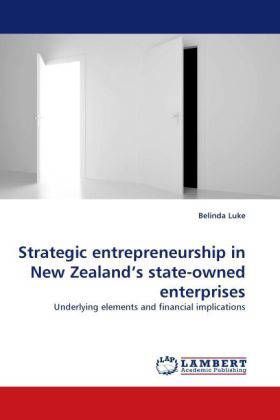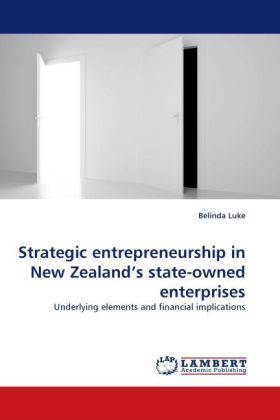
Bedankt voor het vertrouwen het afgelopen jaar! Om jou te bedanken bieden we GRATIS verzending (in België) aan op alles gedurende de hele maand januari.
- Afhalen na 1 uur in een winkel met voorraad
- In januari gratis thuislevering in België
- Ruim aanbod met 7 miljoen producten
Bedankt voor het vertrouwen het afgelopen jaar! Om jou te bedanken bieden we GRATIS verzending (in België) aan op alles gedurende de hele maand januari.
- Afhalen na 1 uur in een winkel met voorraad
- In januari gratis thuislevering in België
- Ruim aanbod met 7 miljoen producten
Zoeken
Strategic entrepreneurship in New Zealand's state-owned enterprises
Underlying elements and financial implications
Belinda Luke
Paperback | Engels
€ 110,45
+ 220 punten
Omschrijving
The concept of strategic entrepreneurship has received increased attention over the past ten years. Viewed as the intersection of entrepreneurship and strategy, this field of research is populated by conceptual studies which focus mainly on the nature and perceived benefits of strategic entrepreneurship. Similarly, the study of entrepreneurship in a public sector context has gained increasing support in recent years, but also remains underexplored. To address these gaps, this thesis considers: What are the underlying elements and financial implications of strategic entrepreneurship in New Zealand's state-owned enterprises [SOEs]? New Zealand's SOE sector, comprising 17 government-owned, commercially focused organisations, is considered to be a prime subject for this research. Well known for their implementation of new public management [NPM], many New Zealand SOEs have also been publicly recognised as both innovative and entrepreneurial. The research question is addressed by first developing a preliminary framework of strategic entrepreneurship from literature on entrepreneurship and strategy. This framework is then examined in the context of case studies on activity.
Specificaties
Betrokkenen
- Auteur(s):
- Uitgeverij:
Inhoud
- Aantal bladzijden:
- 344
- Taal:
- Engels
Eigenschappen
- Productcode (EAN):
- 9783838358796
- Verschijningsdatum:
- 21/10/2010
- Uitvoering:
- Paperback
- Afmetingen:
- 152 mm x 229 mm
- Gewicht:
- 503 g

Alleen bij Standaard Boekhandel
+ 220 punten op je klantenkaart van Standaard Boekhandel
Beoordelingen
We publiceren alleen reviews die voldoen aan de voorwaarden voor reviews. Bekijk onze voorwaarden voor reviews.









